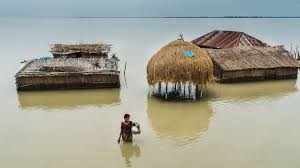According to the report, developing countries’ overall yearly investment needs would reach $2.4 trillion by 2030, with half of that amount coming from outside financing and the other half from public and private sources.
By the end of the decade, developing nations would need to get $1 trillion a year in outside funding for climate action, according to research released on Tuesday, according to reporters. In order to secure this external financing and match it with their own funds to combat climate change, developing countries will need to cooperate with investors, wealthy nations, and development banks, according to the report, which was commissioned by the current and previous hosts of the climate summit, Egypt and Britain.
The report underlines the need for funding to reduce emissions, increase resilience, address climate change harm, and restore the land and natural environment. It was released in advance of the COP27 meeting in Egypt’s discussions on financing for climate change.
According to the research, “the world needs a breakthrough and a new pathway on climate financing that can mobilize the $1 trillion in outside funding needed by rising economies and developing nations other than China by 2030.”
By 2030, it was predicted; developing countries would need to invest $2.4 trillion annually, with half of that amount coming from outside funding and the other half coming from domestic public and private sources. The present investment, according to the report, is close to $500 million.
“Unlocking substantial climate funding is the key to overcoming today’s development difficulties,” said Vera Songwe, one of the report’s authors.
The research stated that although yearly flows from development banks could triple the local and international private sectors should have the greatest growth. Also increased should be concessional loans, which have better conditions than markets.
This means that in order to attract investments from the private sector and philanthropy, governments must have access to inexpensive, durable low-cost financing from the multilateral development banks, according to the research.
The report also urges developed country governments to provide twice as much in grants and low-interest loans by 2025, from the current $30 billion yearly.
Delegates at the COP27 in Egypt, are anticipated to concentrate on financial issues on Wednesday.

















